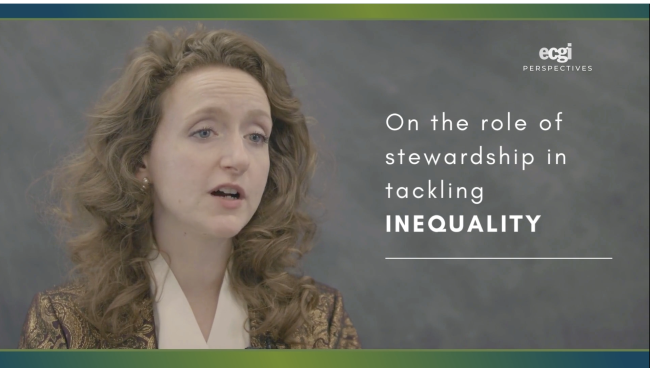Cast Your Vote on Climate
Issue 16 | November 2024
Greetings from Brussels!
Investor movements in the past have often emerged as responses to political inaction and uncertainty, a prominent example being the divestment campaign against apartheid in South Africa that dated back to the 1960s.
So, while political enthusiasm for sustainability seems to curb, it is a good time to remember the role investors have played in advancing corporate sustainability in the past and their potential to push the ball forward again.
In the May 2024 Newsletter, I explored ESG shareholder proposals and their challenges. In the US, such proposals face political resistance and skepticism from the SEC and courts. Submitting ESG proposals is increasingly more challenging, while ‘anti-ESG’ proposals are on the rise. In Europe, corporate sustainability requirements are more advanced, yet shareholders are less empowered to engage on these topics. Furthermore, there is a noticeable sustainability fatigue and overregulation concerns, which have tempered policymakers’ enthusiasm and pushed sustainability down the agenda.
In light of these different obstacles, we asked: ‘Should regulation be more accommodating of ESG shareholder proposals?’ and 70% of respondents replied that ‘Yes, many ESG topics are of relevance to shareholders, so the barrier for them to submit proposals should be low.’
Building on this clear call for action, let’s explore a mechanism that can amplify shareholder voices and strengthen corporate accountability.
Say on Climate?
So-called ‘say-on-climate’ votes offer shareholders a formalized way to express their views on the company’s corporate climate strategies and transition plans. The say-on-climate concept originated with investors and other stakeholders who called for transparency and action on climate issues. Initially targeted at high-emission companies, the idea has since expanded.
There are different forms of say-on-climate votes, depending on who initiates them. In some cases, they are proposed by shareholders as resolutions, urging companies to adopt or revise their climate strategies. In others, management voluntarily introduces these votes as part of their annual meeting agenda, aiming to signal their commitment to transparency and engage shareholders in a structured dialogue about their climate plans.
Say-on-climate votes require companies to regularly disclose their climate plans and progress, creating a consistent cycle of evaluation and feedback, identifying gaps and aligning long-term goals. They allow companies to signal how committed they are and shareholders to weigh in on this path. The closer a climate-related decision is to the core of a company’s strategy or business model, the more relevant it becomes to shareholders, as they provide the capital and bear the financial risks of insufficient or delayed climate action.
A say-on-climate vote provides all shareholders with an opportunity to cast their vote on sustainability, thereby also democratizing the shareholder engagement process. It can reduce reliance on other, less accessible and more resource-intensive engagement methods like private discussions or proxy battles.
Furthermore, these votes signal where companies and shareholders diverge on sustainability strategies. This sends a signal to the markets and can incentivize companies to align their performance with shareholder expectations.
In the EU, Corporate Sustainability Reporting Directive (CSRD) and the Corporate Sustainability Due Diligence Directive (CSDDD) already require many companies to produce detailed sustainability reports and transition plans. Incorporating shareholder votes on these reports would not impose a significant burden but would link sustainability reporting and corporate governance more meaningfully.
Or Nay on Climate?
Yet, there are also valid reasons to approach with caution the idea of shareholder votes on companies’ transition plans.
Some critics say that shareholders may lack the expertise to evaluate the feasibility or ambition of complex climate strategies. As seen with say-on-pay votes, shareholders often fail to scrutinize proposals in detail, raising concerns that say-on-climate votes could lead to a rubber-stamping exercise. The general meeting might not be the appropriate forum for engaging in such nuanced debates.
The binary nature of voting outcomes, approve or reject, fails to capture the full spectrum of shareholder perspectives on climate strategies. This lack of granularity limits the usefulness of the feedback and could even lead to misinterpretations of shareholders views.
Another concern is that say-on-climate votes might blur the division of competence in corporate governance, which is interpreted differently depending on the jurisdiction. Allowing shareholders to weigh in directly on sustainability strategy could undermine board autonomy.
Finally, and perhaps most critically, there is no guarantee that shareholders will use their votes to support sustainability initiatives. Recent headlines suggest a growing sense of sustainability fatigue among investors, with some questioning the need for aggressive climate action. In such an environment, shareholder votes could just as easily be used to delay progress. A negative vote might even give companies a stronger mandate to retreat from more ambitious policies, effectively slowing down or reversing their climate commitments.
A Shared Responsibility
Despite the potential downsides, shareholder votes on sustainability can be a valuable tool to compare and align the views of companies and their investors. As political momentum on sustainability stalls, the private sector has an opportunity to lead and take proactive steps to empower shareholders. By introducing mechanisms like say-on-climate votes, they can show that sustainability is not just a regulatory obligation but a shared responsibility.
What is your view on this mechanism to advance corporate sustainability? Let me know in the poll below.
Wishing you all a wonderful holiday season and I look forward to reconnecting in January 2025 with more insights on governance.
Cordially yours,
Marleen
MINI POLL
More from ECGI
Working papers
ECGI Blog
Videos
- Does Sustainable Investing Work? series (2024)
- Stewardship Perspectives series (2022)
Previous issues...
Issue #15 - Conflicting Cultures (October 2024)
Issue #14 - Commitment Issues (June 2024)
Issue #13 - Shareholder (Dis)empowerment (May 2024)
Issue #12 - Crypto and Catastrophic Governance (April 2024)
Issue #11 - CSDDD – Too big to fail? (March 2024)
Issue #10 - Compensate or abate? (February 2024)
Issue #9 - CEO Activism (January 2024)
Issue #8 - Does it (still) pay off to pollute? (November 2023)
Issue #7 - Mind the Gender (Eco) Pay Gap (October 2023)
Issue #6 - KPop and Meme Stock (September 2023)
Issue #5 - Exit or Voice? Time to take stock (June 2023)
Issue #4 - Controlling Shareholders (May 2023)
Issue #3 - Practicing Systematic Stewardship (April 2023)
Issue #2 - The Who, What and Why of ESG (March 2023)
Issue #1 - Responsible Capitalism (February 2023)














